The Best Performance Management Software
We’ve reviewed the best systems for tracking employee performance, managing reviews, and setting goals across your team. Whether you’re in healthcare or professional services, we can help you find a platform that integrates with your existing HR systems and fits your budget.
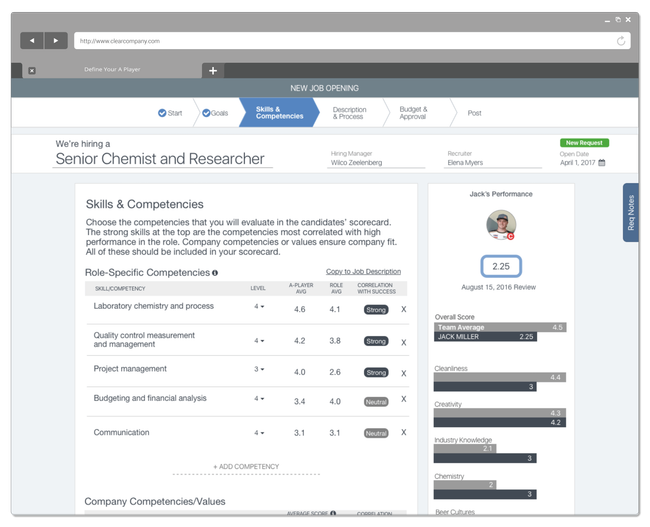
- Customizable platform
- Multiple users have praised customer support
- Software is easy to navigate
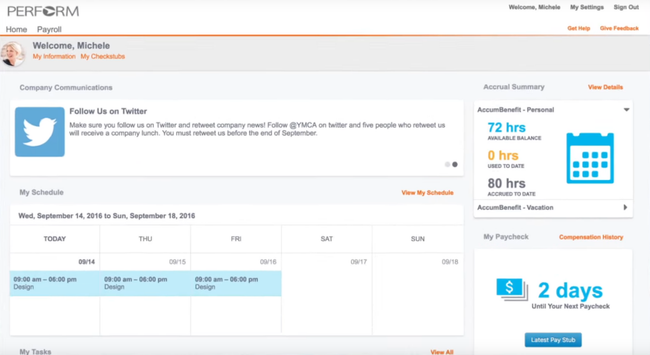
- Offers an intuitive user interface
- Includes compliance management
- Automates HR-related tasks
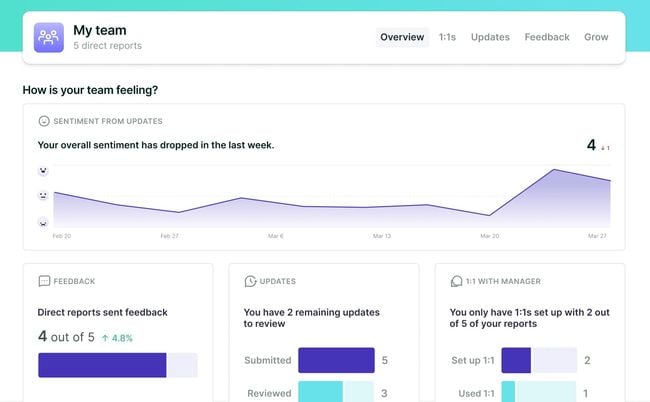
- Objective and key results (OKR) solution
- Real-time feedback monitoring
- Intuitive UI for fast implementation
Performance management software helps organizations track, analyze, and improve employee efficacy through goal setting, feedback, evaluations, and development planning. We reviewed the top solutions on the market and used our advanced review methodology to rank our top picks below.
- ClearCompany: Best Overall
- Paycor: Best Talent Management Module
- Lattice: Best for Financial Companies
- BambooHR: Best for Tech Companies
- Rippling: Best for Healthcare
- Leapsome: Best for Professional Services
- PerformYard: Best for Small Businesses
- Trakstar: Most Customizable Reviews
- Namely: Best HR Suite
ClearCompany - Best Overall
ClearCompany includes advanced reporting and analytics tools, with over 30 pre-built reports, AI-driven insights, and interactive drill-down capabilities. The performance analytics suite transforms raw performance data into actionable insights, tracking metrics like review cycles and goal completion. Overall, it’s a solid performance evaluation software for driving employee growth and improving your review efficiency.
Your managers and HR teams can instantly access ready-to-use reports, including:
- 360-Degree Reviews Cycle Reports: Measure engagement and feedback patterns in peer reviews.
- 9-Box Talent Matrix: Categorize employees based on growth potential and performance.
- Cycle Progress Reports: Analyze completion rates of performance reviews.
- Employee Goal Use & Progress Reports: Assess progress trends and goal-setting habits.
- Employee Score Trends Reports: Measure performance trends over time.
- Manager Scoring Reports: Identify differences in scoring behavior among managers.
Additionally, your HR teams can filter and segment performance data by review cycle, employee role, department, and manager scoring patterns. This makes it much easier to spot underperforming teams and high-potential employees, helping you quickly identify where coaching and support are needed.
ClearCompany’s ClearInsights platform utilizes artificial intelligence to answer performance-related questions instantly. The AI Answer Builder interprets your data and offers actionable suggestions to your HR department for faster, smarter decisions. Plus, you can convert reports into full-screen, interactive visuals for leadership presentations and even schedule report sharing to keep executives up to date.
Paycor - Best Talent Management Module
Paycor’s talent management module makes it easy to coach and grow your workforce. Managers get pre-built, customizable templates for 1:1 check-ins, keeping conversations focused and consistent across your teams. Employees and managers can also set SMART or OKR-style goals, whether individual, departmental, or even company-wide. This performance appraisal software also includes embedded AI to assess feedback tone, minimizing bias and guiding more constructive assessments.
The platform extends into career development, with role and growth profiles that define clear expectations. Built-in job assessments align performance with development plans, and 9-box grids help you match coaching to each employee’s potential. Additionally, succession planning tools help you map out future roles, define competencies, and assign development tasks that feed right into performance reviews.
To build leadership skills, Paycor offers step-by-step training:
- Curated learning modules on feedback, communication, DEI, and coaching.
- Practice-reflect-apply framework for learning a concept, applying it, then reflecting on the platform.
- Pulse surveys that collect anonymous feedback from direct reports to assess leadership effectiveness.
- Insights dashboards that visualize competency gaps and improvement over time for executives and HR.
Paycor no longer publishes public pricing plans, though the Complete plan originally started at $299/month, plus $16/employee/month. This included talent development, compensation planning, and career management tools.
Lattice - Best for Financial Companies
Lattice is an effective employee engagement software for financial companies, with over 400 financial service customers. The platform helps companies build top talent from within by implementing development plans for every individual. This can be done company-wide, allowing bank and credit union board members to spot high-performing individuals within every branch. Furthermore, creating and communicating career goals can encourage employees to stay with the company and ascend.
Lattice also includes an advanced people analytics module. Managers can analyze real-time team metrics, such as sent feedback and employee sentiment. Businesses can connect performance with compensation to determine pay raises and ensure competitive wages based on role and geography. This helps financial businesses that see many market swings ensure they compensate their employees fairly.
One potential drawback of Lattice is its integration with HR platforms. While it does integrate with some, like BambooHR and Workday, the list is fairly short compared to the total amount of platforms on the market.
BambooHR - Best for Tech Companies
BambooHR is best for mid-sized tech companies because it offers a complete HR solution with a strong performance management module. It offers flexible review feedback for employees who prefer to receive reviews more than once a year. The reviews can happen after completing projects and in a casual setting to promote steady feedback communication. This is ideal for tech companies with many remote workers and project-based employees, as it helps keep them acquainted with management through conversation instead of formal meetings.
Additionally, BambooHR’s employee well-being module is effective for tracking a company’s morale. Surveys can be conducted at all levels, asking about overall satisfaction at the company, motivations, and relationships with coworkers. This helps businesses gauge happiness levels and visualize areas of improvement. To cap it off, they can be conducted on a desktop or the mobile app, making it simple to use.
We recommend BambooHR for midsize companies, as its performance management module is only available on the Pro plan. This is more expensive than the Core plan, which only has HR capabilities.
Rippling - Best for Healthcare
Rippling combines performance management with a broader set of HR, IT, and operations functions, which we found well-suited for the healthcare industry. It’s a full HR system, so its performance management module is integrated with other features like payroll, benefits administration, and computer and software management. The system automatically assigns compliance training for HIPAA to all employees and labor law adherence for healthcare workers.
Rippling’s automation capabilities extend to onboarding and offboarding, ensuring that employee performance data is up-to-date and reflective of any changes within the organization. This integrated approach saves time and gives managers and HR professionals a full view of the overall employee lifecycle. Its survey module is also effective for employee engagement, as they can provide honest feedback to their employer.
However, some users have reported Rippling’s setup to be complex due to its wide range of features, though it does have extensive onboarding and training modules to combat this.
Leapsome - Best for Professional Services
Leapsome is a performance management software that helps companies engage and retain employees, making it a good fit for professional service firms and consultants. We like its learning module, as owners and upper management can create educational paths that help encourage good habits and advance career development. With each consultant having their own methods and routines, this can help the company become more unified.
Additionally, Leapsome’s integration options are ideal for consulting firms. These options include several leading HR platforms like Rippling, Paylocity, and BambooHR. This helps create seamless data sync from the existing HR platform to bring over employee data. Furthermore, the system helps keep every consultant aligned with company goals, as management can leave comments and explain each goal in full context. On the other hand, we found in our research that some users reported a lack of customization options for items like OKRs.
PerformYard - Best for Small Businesses
PerformYard is an affordable performance management solution for small businesses. The software lets users conduct 360-degree reviews, which include self-assessments and peer and manager reviews, to get multiple perspectives and external input. HR teams can then visualize this data on a grid and analyze it to evaluate each employee thoroughly.
Plus, PerformYard includes a goal management module. Owners can create goals from the top down to ensure every employee hits key company-wide OKRs while receiving continuous feedback. PerformYard offers an affordable pricing plan for small businesses. It starts at $5/person/month and includes reviews, goals, feedback, and reporting modules for complete performance management. One downside to PerformYard is its employee engagement module costs an additional $1-$3/person/month.
Trakstar - Most Customizable Reviews
Trakstar’s performance management module is highly customizable, allowing it to adapt to your company’s specific needs. You can generate unlimited templates, competencies, and workflows for performance reviews to fit your business’s roles and departments. This allows you to create custom reviews for employees with highly specialized positions that don’t fall under a specific department, like a compliance officer in a financial institution or a litigation consultant in a professional services firm.
Trakstar’s 360-degree review process helps generate comprehensive feedback about each employee. It includes several evaluation tools, including:
- Standard questions: Create questions that are relevant to each employee’s role and objectives.
- Rating scales These ensure standardization for each review and help create measurable review results.
- Goal setting: Set and track SMART goals throughout the year and use them to evaluate performance. These can be broad company objectives or personal goals.
- Peer feedback: Receive feedback from peers about each individual, helping you gain a more comprehensive understanding of their impact on the workplace. The feedback can be kept anonymous.
Additionally, the performance management module compiles all feedback and review data and generates detailed reports to identify performance insights. The reports help you gain a broad overview of the entire company’s performance and show where each employee falls within the company or their department. Using this, you can identify top talent and better understand individuals falling behind.
Namely - Best HR Suite
Namely is a solid pick for mid-sized companies due to its scalability and full HR suite, including payroll, benefits, talent management, and compliance. The platform grows with businesses, supporting their evolving operations through a high degree of customization. This includes custom workflows, fields, and reports, ensuring that the software adapts to the company’s unique way of operating rather than the other way around.
Additionally, Namely supports mid-market firms through its advanced performance management features. These include goal setting, performance reviews, and feedback tools, which are essential for maintaining and improving employee performance and engagement in a growing company. Despite these features, one main drawback is it can be expensive for large businesses due to the per-employee pricing model.
What is Performance Management Software?
Performance management software tracks, analyzes, and evaluates employee performance to ensure individuals and teams are engaged and on track with organizational goals. By coordinating and collecting performance reviews, these systems help train managers and employees by letting companies better understand employee performance and productivity.
This software can sometimes be referred to as a talent management system, a specific type of human resource software. Managers can collect data on their people in many different ways but will primarily use this software to better align their employees with organizational goals set by upper management.
For employees, a performance management solution can help inform management of how beneficial of a team member you’ve been–which can influence compensation, career trajectory, company goals, and even streamline hiring decisions. This can be through annual performance reviews or self-assessment tools where employees can set individual goals.
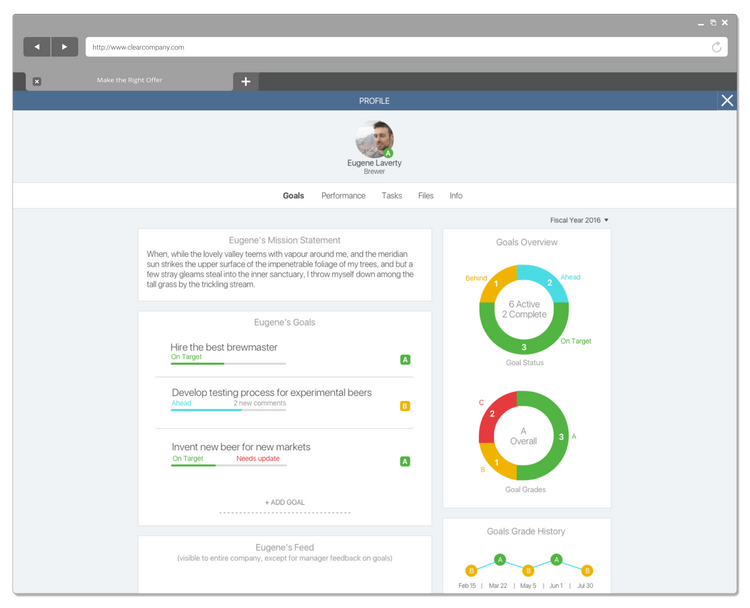
Key Features
- 360-degree feedback: Provide employees with confidential and anonymous feedback from their colleagues, subordinates, and supervisors. Multi-layer feedback can be passed across the company hierarchy regarding problem-solving abilities, interpersonal skills, business acumen, technical capabilities, influence, and communication skills.
- Goal management: Manage and track performance goals for your employees and management staff. Set weekly, monthly, quarterly, and yearly goals. Conduct audits to maintain ongoing communication about goal setting and progress.
- Performance reviews: Let employees evaluate their own performance and compare it with team members’ or management’s feedback. Help facilitate management/employee communication, identify employee strengths and weaknesses, set individual goals, make informed compensation decisions, and ensure human resources are leveraged for the organization’s maximum benefit.
- Succession planning: Craft and execute strategic and long-term succession plans to help employees take the next step in their careers based on competencies and skills. Track and analyze employees to discover high-performing individuals who can succeed as company leaders. Monitor employee talents and skills and ensure training and development can be encouraged for replacements.
- Reporting: Run performance reports and share information among key personnel, department heads, and senior leaders. Create customized reports based on performance evaluation needs, such as completion status reports.
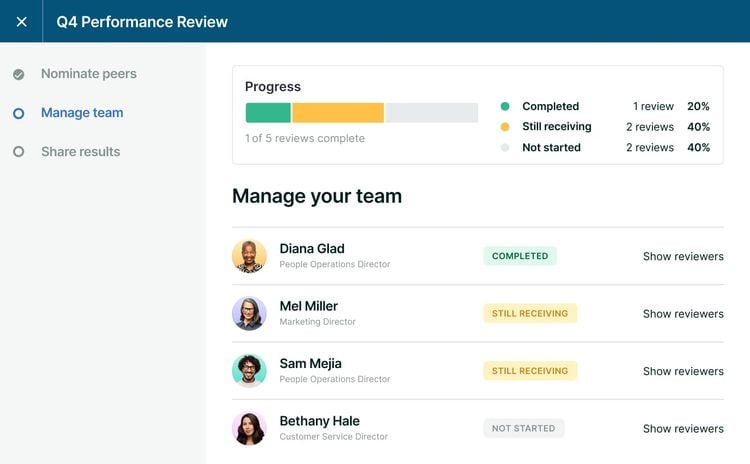
Primary Benefits
The top benefits of a performance management platform include:
Improve Employee Engagement
This software helps automate employee engagement surveys that ask clear questions to measure employee satisfaction. These let your business determine what is working and what isn’t, along with what your employees are the least satisfied with. By providing this information to senior management, you can inform better strategies moving forward.
Employees can also use performance management software for their own benefit. This includes tracking their career progression, their evaluations (from other employees or management), and their overall understanding of their performance in relation to the company’s goals.
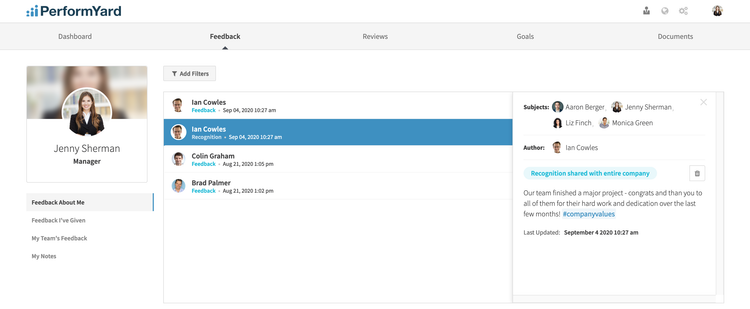
Gather Continuous Feedback
Rather than conducting annual reviews of employees, continuous performance feedback helps align and develop your workforce more consistently. This human-centered approach promotes, evaluates, and improves employee performance. By continuously meeting with staff to review their current workload, you ensure all employee goals are aligned.
Other features offered by performance management software that tie in with a continuous feedback philosophy include:
- Check-ins: Allow managers to check in with employees regarding their performance periodically
- Crowdsourced feedback: Let employees ask for advice from their coworkers and managers through message boards and chats
- Performance dashboard: A unified view that displays feedback, summaries, and established goals for each employee with their own login.
- Employee recognition program: Acknowledge employees’ contributions through gift cards, vouchers, or performance-based bonuses.
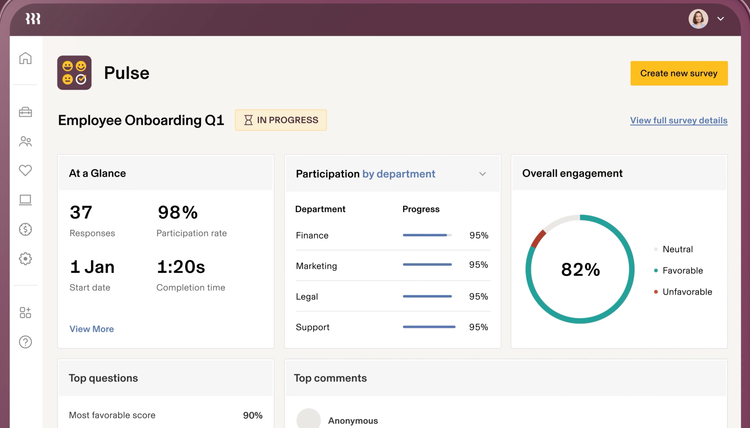
Discover Professional Development Opportunities
Career mapping and development planning components are the most critical parts of planning the long-term careers of your company’s employees. The system will identify areas for improvement, set goals, measure progress, and outline a strategy to ensure the person can stay on the path to new career opportunities and better serve the company.
This software provides personalized development plans, allowing your employees to direct their professional development and correct performance. It will also help conduct reviews and prepare development plans by monitoring employee performance on new projects, workshops, seminars, and even new qualifications they may garner, such as certifications.
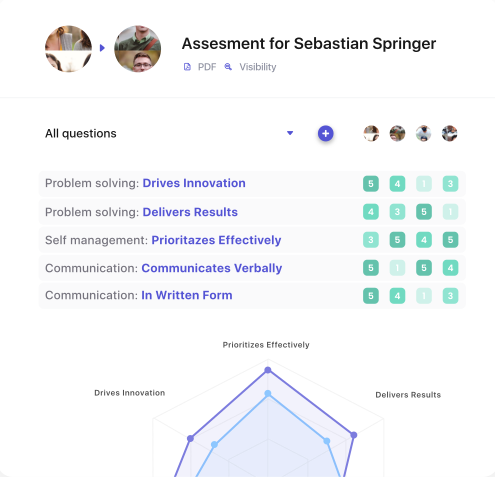
Pricing Guide
The cost of performance management software pricing starts between $7 and $40/employee/month.
- Entry-level performance evaluation software: $7-$10/employee/month
- Mid-tier software: $10-$20/employee/month
- Enterprise performance appraisal software: $20-$40/employee/month
The pricing model is generally a subscription, considering the total number of employees you will run performance reports on. It may sometimes be stated as a per-user/month cost, but as long as your employees log in to access a portal or view information about their performance, they will require their user license.
For example, if your business has 100 employees and finds a performance management software advertised at $6/user/month, you will be looking at an overall monthly cost of $600/month. These solutions may have upfront costs, such as the cost of implementation and training.
Trends in Performance Management Tools
Smarter Feedback Capabilities
According to a Gallup poll, only 2 in 10 employees say their performance is managed in a way that motivates them to do outstanding work. However, performance tools today leverage advanced feedback features and instant recognition for employee achievements. AI-driven platforms now offer real-time feedback loops, helping your managers resolve employee underperformance while encouraging positive behaviors. These developments align with modern continuous process management, supporting dynamic performance reviews.
The Rise of Continuous Performance Management
Period annual reviews are giving way to continuous performance management, where monthly check-ins or quarterly check-ins keep employees synced with company goals. This helps boost employee engagement by facilitating frequent conversations around growth rather than relying on outdated, demotivating appraisal methods.
Personalized Development Plans
To better motivate employees, performance review software offers personalized development plans that leverage role-specific training and qualitative and quantitative OKRs. This makes it easier to give employees relevant learning opportunities that reflect their strengths, career goals, and organizational needs.
More User-Friendly Designs and Data-Driven Insights
A major shift in performance management techniques includes user-friendly tools that simplify analytics and reporting and new employee onboarding workflows. AI-powered insights allow you to optimize the performance review process and improve data-driven decision making.












































